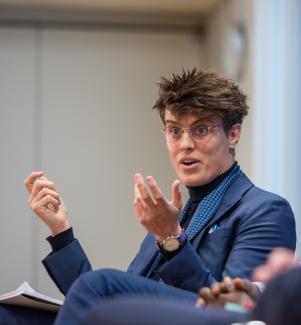
Cities that work strategic capacity development for global future cities
As part of the Global Future Cities Programme, in collaboration with the UK Built Environment Advisory Group (UKBEAG), Cities that Work initiative are co-delivering three capacity building sessions to 19 middle income cities. The recordings of these sessions, their relevant materials as well as other sessions relevant to emerging city policymakers a will be available below.
The Global Future Cities Programme itself is part of the UK Government’s Prosperity Fund and supports sustainable urban development, while achieving inclusive prosperity and alleviating high levels of urban poverty.
Cities that Work sessions:
Building Back Better & Introduction to the Programme
IGC Speaker: Prof Sir Paul Collier
Date: 21st January, 2021
The introductory session considered the recovery from Covid-19 in the context of building back better and will demonstrate the continuing importance of the SDGs as a framework for delivering sustainable urbanisation. It featured introductory remarks from the UKBEAG, the FCDO and UN Habitat together with contributions from Sir Paul Collier CBE, Director of the International Growth Centre, and Mayor Marvin Rees from Bristol City Council.
The recording for this session can accessed here
Governance & Collaboration
IGC Speaker: Shahrukh Wani
Date: 4th February, 2021
Drawing on extensive policy research together with the international standard for sustainable cities and communities (ISO37106), this session will consider the importance of achieving alignment between sectoral priorities and policies together with effective collaboration between different tiers of government, ministries, and departments. The session will be facilitated by the International Growth Centre and the British Standards Institution together with practical experience from Bristol City Council.
You can watch the video recording from the event here
Project Finance & Procurement
IGC Speaker: Oliver Harman
Date: 25th February, 2021
This session will consider various methods for securing project finance, ranging from municipal bonds to own sourced revenue, together with the way in which to present bankable projects for funding. It will include an overview of HM Treasury Five Case Model and will be delivered by the International Growth Centre and HM Treasury Infrastructure & Projects Authority together with input from the International Finance Corporation.
You can watch the video recording from the event here
Other UKBEAG sessions:
Integrated & Inclusive Urban Planning
Date: 27th January 2021
Drawing on examples from the Bristol One City Plan, this session will consider the importance of integrated and inclusive planning as a prerequisite for achieving lasting social, economic, and environmental improvement while simultaneously addressing the needs of the marginalised and the vulnerable. The session will be facilitated by the Design Council together with University College London Development Planning Unit.
Evidence-based Design & the Effective use of Data
Date: 18th February 2021
Building on the international standard for sustainable cities and communities (ISO37106), this session considered the importance of evidence-based design and data as a pre-requisite for developing and delivering citizen centric applications that will achieve meaningful cost benefit and service level improvement. The session was jointly facilitated by the British Standards Institution, Smart London and the International Growth Centre (IGC).
The recording for this session can be accessed here
Implementation & Enforcement, Monitoring & Evaluation
Date: 04th March 2021
In this penultimate session, the British Standards Institution will be joined by HM Treasury Infrastructure & Projects Authority to discuss the importance of regulations and standards together with robust assurance and approvals processes for achieving effective project delivery.
Reflections on the Series and Next Steps
Date: 11th March 2021
The concluding session in the series will include reflections on the series from UKBEAG, the FCDO and UN Habitat together with input from the Delivery Partners and will consider next steps in the programme.





